The Main Topics for Coursework or a Thesis Statement in Artificial Intelligence
Artificial Intelligence (AI) is changing the world, from machine learning and the Internet of Things to Robotics and Natural Language processing.
Research is needed to understand more about AI and how it will affect the future.
AI-powered machines are likely to replace humans in many fields and the consequences of this are still largely unknown.
There are many topics of vital importance to choose from if you’re a student trying to decide on a topic involving AI for your thesis.
Image source: Freepik.com
Machine learning (ML) as a Thesis Topic
Artificial intelligence enables machines to automatically learn a task from experience and improve performance without any human intervention.
Machines need high-quality data to start with. They are trained by building machine learning models using the data and different algorithms.
The algorithms depend on the type of data and the tasks that need automation.
A topic for your research could involve discussing wearable devices. They are powered by machine learning and are becoming increasingly popular.
You could discuss their relevance in fields like health and insurance as well as how they can help individuals to improve their daily routines and move towards a more healthy lifestyle.
Deep learning (DL) as a Thesis Topic
Deep Learning is a subset of ML where learning imitates the inner workings of the human brain. It uses artificial neural networks to process data and make decisions.
The web-like networks take a non-linear approach to processing data which is superior to traditional algorithms that take a linear approach.
Google’s RankBrain is an example of an artificial neural network.
Deep learning is driving many AI applications such as object recognition, playing computer games, controlling self-driving cars and language translation.
A research topic could involve discussing deep learning and its various applications.
Reinforcement learning (RL) as a Thesis Topic
Reinforcement learning is the closest form of learning to the way human beings learn. For instance, students learn from their mistakes and a process of trial-and-error.
There are many different ways to use AI in education to help students, such as using AI-powered tutors, customized learning and smart content.
RL works on a similar principle to learning from a process of trial-and-error. Google’s AlphaGo program beat the world champion of Go in 2017 by using RL.
Students who don’t yet have the skills to handle complex assignments can make use of various tools, writing apps and professional writers.
To find help with your student papers when you’re conducting research for a university, EduBirdie has free plagiarism checker and citations tools but professional writers who can take the pressure off you.
At U.K. EduBirdie , a professional thesis writer will finish your paper for you. It also offers editing and proofreading services at very reasonable prices.
Image source: Freepik.com
Natural language processing (NLP) as a Thesis Topic
This area of AI relates to how machines can learn to recognize and analyze human speech. Speech recognition, natural language translation and natural language generation are some of the areas of NLP.
With the help of NLP, systems can even read sentiment and predict which parts of the language are important. Revolutionary tools like IBM Watson, Google Translate, Speech Recognition and sentiment analysis show the importance of NLP in the daily lives of individuals.
NLP helps build intelligent systems, such as customer support applications like chatbots and AI in education is also a great example.
Chatbots use NLP and machine learning to interact with customers and solve their queries. Your research topic could relate to chatbots and their interaction with humans.
Computer vision (CV) as a Thesis Topic
Millions of images are uploaded daily on the internet. Computers are very good at certain tasks but they can struggle with simple tasks like being able to recognize and identify objects.
Computer vision is a field of AI that makes systems so smart that they can analyze and understand images. CV systems can even outperform humans now in some tasks like classifying visual objects.
One of the applications of computer vision is in autonomous vehicles that need to analyze images of surroundings in order to navigate.
A study topic could involve discussing computer vision and how using it allows smart systems to be built. Applications of computer vision could then be presented.
Recommender systems (RS) as a Thesis Topic
Recommender systems use algorithms to offer relevant suggestions to users. These may be suggestions on a TV show, a product, a service or even who to date.
You will receive many recommendations after you search for a particular product or browse a list of favorite movies. RS can base suggestions on your past behavior and past preferences, trends and the preferences of your peers.
A very relevant topic would be to explore the use of recommender systems in the field of e-commerce. Industry giants like Amazon are currently using recommender systems to help customers find the right products or services.
You could discuss their implementation and the type of results they bring to ecommerce businesses.
Robotics as a Thesis Topic
Robots can behave and perform the same actions as human beings, thanks to AI. They can act intelligently and even solve problems and learn in controlled environments.
For example, Kismet is a social interaction robot developed by MIT’s AI lab that can recognize human language and interact with humans.
Robots and AI are changing the way businesses work. Some people argue that this will have an adverse effect on humans as they are replaced by AI-powered machines.
A research topic could aim to understand to what extent businesses will be impacted by AI-powered machines and assess their future in different businesses.
There is an increase in the number of research papers being published in different areas of AI. If you’re a student wanting to come up with a topic involving artificial intelligence for your thesis, there are many vitally important sub-topics to choose from.
Each of these sub-topics provides plenty of opportunities for meaningful research into AI and new ideas on its application in the future as machines keep growing in intelligence.

About The Author
Paul Calderon
Paul Calderon is data security specialist working with a tech startup based in Silicon Valley. After work hours, he helps students studying for their computer science degrees or programming courses with essays, dissertations and term papers. When he isn’t doing any work, he likes playing tennis, cycling, and creating vlogs on local travel.
Most Popular
10 days ago
How to Write a Hook
12 days ago
QuillBot VS Turnitin
13 days ago
Neuroscience vs Psychology
How to cite a letter.
11 days ago
How to Cite Yourself
Artificial intelligence & machine learning thesis statement examples.
freepik.com

Artificial Intelligence (AI) and Machine Learning (ML) are pioneering technologies driving innovation across various sectors. When composing a thesis in this dynamic field, it is essential to commence with a concise and precise thesis statement that encapsulates your research’s essence. Below are examples of good and bad thesis statements, each followed by an analysis illustrating their effectiveness or shortcomings.
Good Thesis Statement Examples
Specific and Clear: “This thesis will investigate the application of machine learning algorithms in predicting stock prices with a focus on the technology sector.” Unclear: “Machine learning can be used to predict stock prices.”
The good example is clear and specific, detailing the application area (stock price prediction) and narrowing the focus to the technology sector. In contrast, the bad statement is vague, lacking both specificity and a defined scope.
Arguable and Debatable: “Despite its benefits, the implementation of AI in hiring processes can inadvertently reinforce existing biases, thus exacerbating workplace inequality.” Dull: “AI in hiring has pros and cons.”
The good statement is debatable and presents a clear argument, highlighting the potential downside of AI in hiring. Meanwhile, the bad statement is indecisive and fails to present a clear argument or stance.
Researchable and Measurable: “This study explores the efficacy of deep learning in the early detection of breast cancer through the analysis of mammographic images.” Uninspiring: “AI can help detect diseases early.”
A good example is researchable and measurable, specifying the AI type (deep learning), application (early detection of breast cancer), and method (analysis of mammographic images). Conversely, the bad statement is too general and lacks specificity.
Bad Thesis Statement Examples
Overly Broad: “Artificial intelligence is changing the world.”
While true, this statement is overly broad, providing no clear direction or focus for research.
Lack of Clear Argument: “AI and ML are important in data analysis.”
This statement, while factual, lacks a clear argument or focus, not providing the reader with an understanding of the research’s purpose or direction.
Unoriginal and Unengaging: “AI is used in many areas like healthcare, finance, and technology.”
Though factual, this statement is unoriginal and unengaging, lacking a specific focus or claim to guide the research.
Crafting an effective thesis statement for AI and ML research necessitates clarity, specificity, and a well-defined argument. Good thesis statements serve as a robust foundation, guiding both the researcher and the reader through the research journey. Conversely, bad thesis statements are vague, broad, and lack a clear focus, which might misguide the research process. By considering the examples provided, students can adeptly craft thesis statements that not only encapsulate their research focus but also engage readers with compelling arguments in the ever-evolving fields of Artificial Intelligence and Machine Learning.
Follow us on Reddit for more insights and updates.
Comments (0)
Welcome to A*Help comments!
We’re all about debate and discussion at A*Help.
We value the diverse opinions of users, so you may find points of view that you don’t agree with. And that’s cool. However, there are certain things we’re not OK with: attempts to manipulate our data in any way, for example, or the posting of discriminative, offensive, hateful, or disparaging material.
Cancel reply
Your email address will not be published. Required fields are marked *
Save my name, email, and website in this browser for the next time I comment.
More from Synthesis Thesis Examples & Samples

Sep 30 2023
Gender & Sexuality Studies Thesis Statement Examples

Criminal Justice Reform Thesis Statement Examples

Sustainable Development Goals (SDGs) Thesis Statement Examples
Remember Me
What is your profession ? Student Teacher Writer Other
Forgotten Password?
Username or Email
The Ultimate Thesis Statement Generator
Thesis Statement Generator
Are you struggling with formulating a concise, compelling thesis statement? You're not alone. Jenni.ai is here to empower your academic writing journey with our thesis statement generator, a sophisticated AI tool dedicated to generating and refining thesis statements. Unlike other tools, Jenni ensures the authenticity and uniqueness of your thesis statement, setting a strong foundation for your academic piece.

Loved by over 1 million academics

Trusted by Academics from Leading Universities
Discover how students from renowned universities enhance their academic writing with Jenni AI

Discover the Edge of Academic Excellence with Jenni AI
Envision a clearer path towards crafting thesis statements with these winning features
Personalized Thesis Statement Suggestions
Jenni AI tailors suggestions based on your input, helping you craft a thesis statement that aligns with your research goals and academic standards.
Get started

Interactive Writing Assistant
Engage with Jenni to refine and improve your thesis statement. It's like having a collaborative partner in the writing process, ensuring your thesis is on the right track.
Accessible Anytime, Anywhere
With Jenni AI, receive thesis statement assistance whenever inspiration strikes, on any device.

User-friendly Interface
With an intuitive interface, Jenni AI is easy to navigate and use, making the process of crafting a thesis statement straightforward and enjoyable.
Your Integrity, Our Priority
Jenni AI isn’t here to do the work for you but to assist you in overcoming the hurdles of thesis statement writing. We take academic integrity seriously. We are here to support you, not to shortcut your academic journey.
How does the Thesis Statement Generator Work?
Jenni AI seamlessly integrates into your research workflow
Sign Up for Free
Create your free Jenni.ai account to unlock a world of academic excellence. Your journey toward a compelling thesis statement begins here.
Input Your Topic
Type in your research topic or a key question you aim to answer through your thesis. Jenni’s intuitive interface makes this step a breeze.
Receive Suggestions
Based on your input, Jenni.ai provides you with a set of preliminary thesis statement suggestions. These are tailored to reflect the essence of your research while adhering to academic standards.
Refine with Real-Time Feedback
Jenni.ai offers real-time feedback as you tweak and refine your thesis statement. This iterative process ensures clarity, coherence, and a strong alignment with your research objectives.
Export Your Thesis Statement
Once satisfied, simply download or copy your thesis statement, and you’re ready to delve deeper into your academic writing journey.
Real Testimonials from Real Achievers
Discover the stories of academics who have experienced the transformative impact of Jenni AI on their academic journeys.

· Aug 26
I thought AI writing was useless. Then I found Jenni AI, the AI-powered assistant for academic writing. It turned out to be much more advanced than I ever could have imagined. Jenni AI = ChatGPT x 10.

Charlie Cuddy
@sonofgorkhali
· 23 Aug
Love this use of AI to assist with, not replace, writing! Keep crushing it @Davidjpark96 💪

Waqar Younas, PhD
@waqaryofficial
· 6 Apr
4/9 Jenni AI's Outline Builder is a game-changer for organizing your thoughts and structuring your content. Create detailed outlines effortlessly, ensuring your writing is clear and coherent. #OutlineBuilder #WritingTools #JenniAI

I started with Jenni-who & Jenni-what. But now I can't write without Jenni. I love Jenni AI and am amazed to see how far Jenni has come. Kudos to http://Jenni.AI team.

· 28 Jul
Jenni is perfect for writing research docs, SOPs, study projects presentations 👌🏽

Stéphane Prud'homme
http://jenni.ai is awesome and super useful! thanks to @Davidjpark96 and @whoisjenniai fyi @Phd_jeu @DoctoralStories @WriteThatPhD
Frequently asked questions
How do i start using jenni ai, is jenni ai free to use, can i use jenni ai on my mobile device.
How does Jenni AI ensure the quality of the thesis statement?
Will Jenni AI write my entire thesis?
What do I do if I need further assistance?
Can I use Jenni AI on my mobile device?using Jenni AI's outline generator guarantee a better grade?
Jenni AI vs Competitors: A Comparative Insight
Experience a notable difference in how you articulate and present your scholarly ideas with Jenni AI
Feature Featire
COMPETITORS
Quality of Suggestions
Advanced AI algorithms ensure high-quality, academically sound thesis statement suggestions tailored to your research topic.
Generic suggestions that may lack depth or alignment with your specific research objectives.
User-Friendly Interface
User-friendly interface designed for seamless navigation and immediate engagement, requiring no technical expertise.
May have a steeper learning curve, with complex features that require time to understand.
Comprehensive Customization
Jenni's outline generator allows for comprehensive customization, empowering you to tailor your outline to your specific needs and preferences.
While competitors may offer customization options, they may not provide the same level of flexibility and adaptability.
Real-Time Feedback
Provides instant feedback as you refine your thesis statement, aiding in the iterative improvement process.
May lack real-time feedback, leaving you without guidance for improvement.
Competitive pricing with a free version available to get you started.
May have higher pricing or lack a free version for trial.
Ready to Elevate Your Thesis Writing?
Sign up for a free account now and experience the power of Jenni AI in crafting compelling thesis statements!

Microsoft 365 Life Hacks > Writing > How AI can help you improve your thesis statement
How AI can help you improve your thesis statement
Creating a thesis statement can be a challenging undertaking. Thankfully, today’s writers can use AI to assist in the creation process. While writing with AI can feel intimidating, the right tools and knowing how to use them can enhance your thesis statement and guide you through the creation process. From generating ideas to polishing your final draft, here’s how to use AI to create a quality thesis.

Selecting a topic
AI-powered tools have access to vast databases of academic papers, journals, and other scholarly materials. If you’re trying to choose a thesis topic or questioning the viability of your current topic, AI can assist by brainstorming ideas and highlighting relevant research you can use as evidence for your claims.
Creating an initial draft
AI tools can help you create a preliminary draft of your thesis statement, which you can continue to build on as your argument and research evolve. You can request a fresh draft at any stage in the writing process, as AI only requires basic information about your topic and area of research to get started. Based on your input, the AI tool will utilize its database of knowledge to generate a thesis statement.

Get the most out of your documents with Word
Elevate your writing and collaborate with others - anywhere, anytime
Refining your thesis with AI feedback
Once you have a solid draft, utilize AI feedback to refine your writing. Ask for an analysis of your thesis statement for clarity, coherence, grammar, and more. By highlighting areas for improvement, AI can help refine your thesis statement so it accurately conveys your research focus and argument. There are a few ways this process not only improves the quality of your statement but also enhances your understanding of what makes an effective thesis:
- Efficiency. AI tools can significantly speed up the brainstorming and drafting phases, giving you more time to focus on researching and outlining your thesis. This is especially useful for tight deadlines.
- Objectivity. AI feedback is based on data and algorithms that can provide a largely unbiased perspective on the quality of your thesis statement. This objective analysis can help you improve your thesis and overall writing.
- Consistency. AI tools can help you align the rest of your paper with your initial thesis statement to ensure consistency throughout your work.
Choosing the right AI tool for academic writing
When seeking an AI assistant for thesis drafting, choose AI tools, including GPTs, designed for professional or academic writing . AI applications that are familiar with academia can offer feedback and suggestions tailored to fit the conventions of scholarly writing.
AI has revolutionized academic writing, offering powerful tools for creating and refining thesis statements. By leveraging AI tools, you can achieve a higher level of clarity and persuasiveness in your work, so try them out the next time you need to write an academic paper!
Get started with Microsoft 365
It’s the Office you know, plus the tools to help you work better together, so you can get more done—anytime, anywhere.
Topics in this article
More articles like this one.

What is independent publishing?
Avoid the hassle of shopping your book around to publishing houses. Publish your book independently and understand the benefits it provides for your as an author.

What are literary tropes?
Engage your audience with literary tropes. Learn about different types of literary tropes, like metaphors and oxymorons, to elevate your writing.

What are genre tropes?
Your favorite genres are filled with unifying tropes that can define them or are meant to be subverted.

What is literary fiction?
Define literary fiction and learn what sets it apart from genre fiction.

Everything you need to achieve more in less time
Get powerful productivity and security apps with Microsoft 365

Explore Other Categories
How to Write a Better Thesis Statement Using AI (2023 Updated)
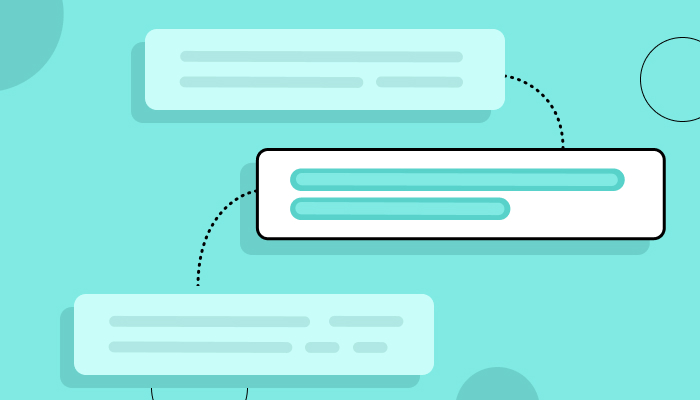
Table of contents

Meredith Sell
With the exceptions of poetry and fiction, every piece of writing needs a thesis statement.
- Opinion pieces for the local newspaper? Yes.
- An essay for a college class? You betcha.
- A book about China’s Ming Dynasty? Absolutely.
All of these pieces of writing need a thesis statement that sums up what they’re about and tells the reader what to expect, whether you’re making an argument, describing something in detail, or exploring ideas.
But how do you write a thesis statement? How do you even come up with one?
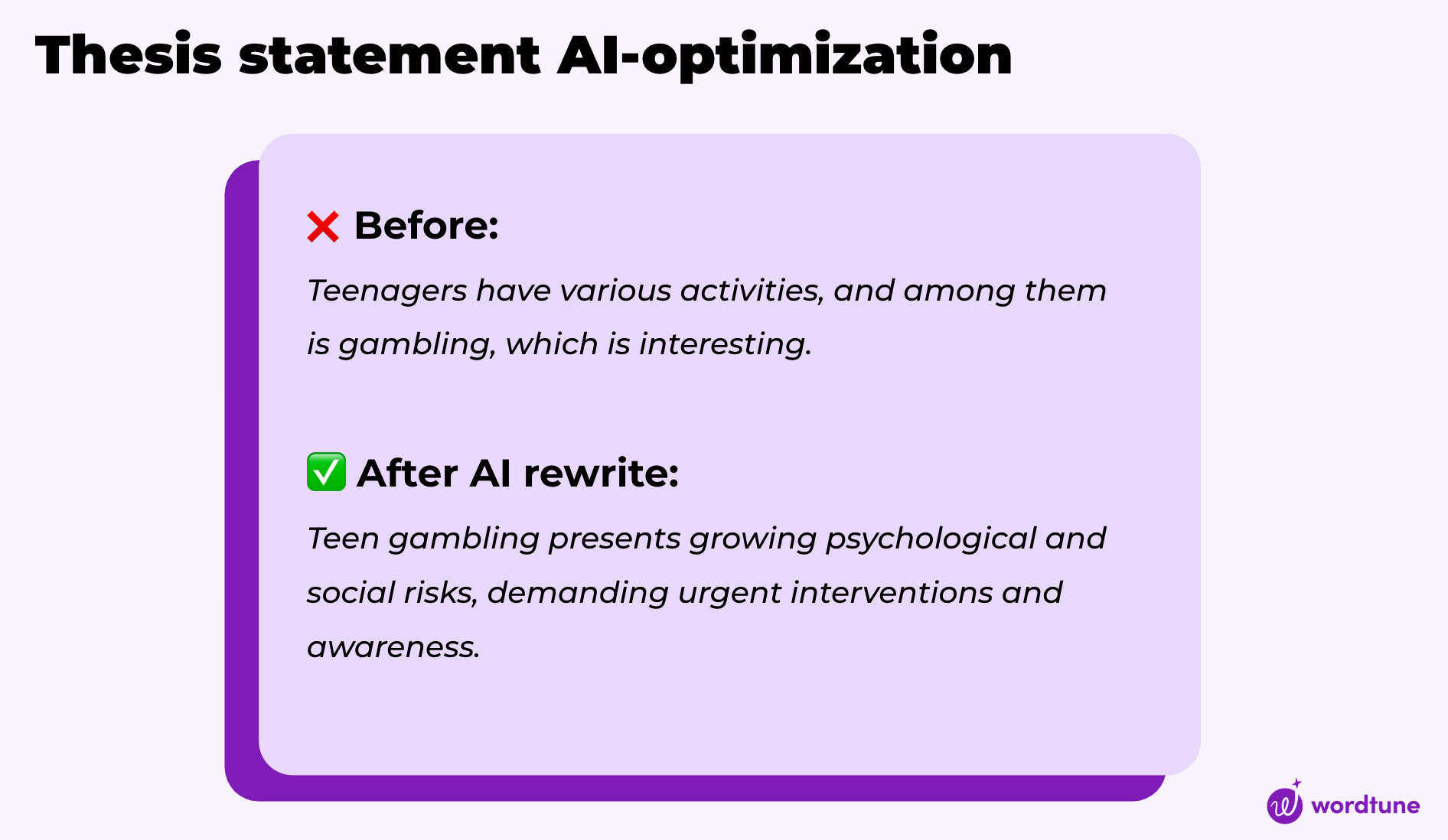
This step-by-step guide will show you exactly how — and help you make sure every thesis statement you write has all the parts needed to be clear, coherent, and complete.
Let’s start by making sure we understand what a thesis is (and what it’s not).
What Is a Thesis Statement?
A thesis statement is a one or two sentence long statement that concisely describes your paper’s subject, angle or position — and offers a preview of the evidence or argument your essay will present.
A thesis is not:
- An exclamation
- A simple fact
Think of your thesis as the road map for your essay. It briefly charts where you’ll start (subject), what you’ll cover (evidence/argument), and where you’ll land (position, angle).
Writing a thesis early in your essay writing process can help you keep your writing focused, so you won’t get off-track describing something that has nothing to do with your central point. Your central point is your thesis, and the rest of your essay fleshes it out.
Get help writing your thesis statement with this FREE AI tool > Get help writing your thesis statement with this FREE AI tool >
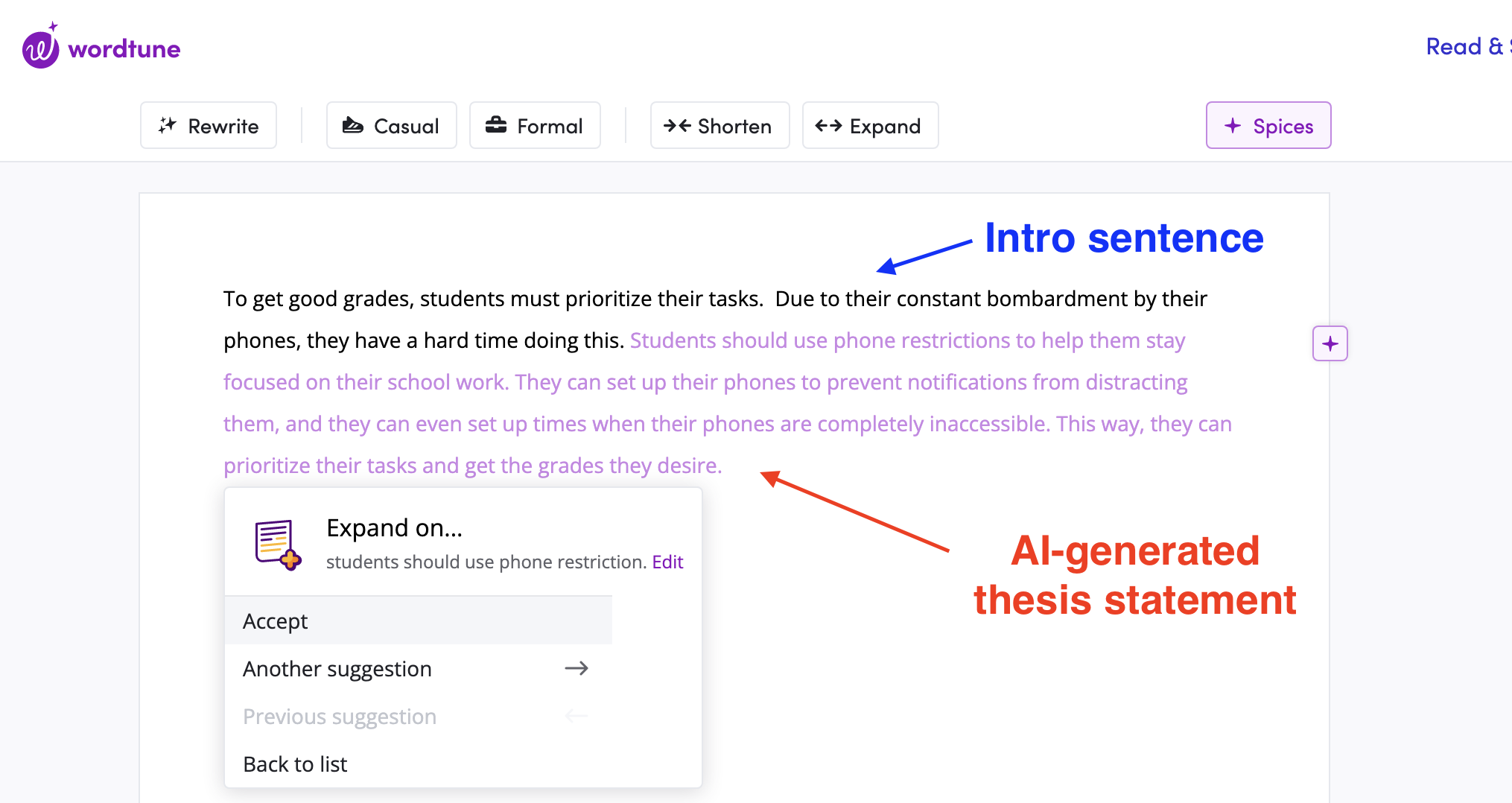
Different Kinds of Papers Need Different Kinds of Theses
How you compose your thesis will depend on the type of essay you’re writing. For academic writing, there are three main kinds of essays:
- Persuasive, aka argumentative
- Expository, aka explanatory
A persuasive essay requires a thesis that clearly states the central stance of the paper , what the rest of the paper will argue in support of.
Paper books are superior to ebooks when it comes to form, function, and overall reader experience.
An expository essay’s thesis sets up the paper’s focus and angle — the paper’s unique take, what in particular it will be describing and why . The why element gives the reader a reason to read; it tells the reader why the topic matters.
Understanding the functional design of physical books can help ebook designers create digital reading experiences that usher readers into literary worlds without technological difficulties.
A narrative essay is similar to that of an expository essay, but it may be less focused on tangible realities and more on intangibles of, for example, the human experience.
The books I’ve read over the years have shaped me, opening me up to worlds and ideas and ways of being that I would otherwise know nothing about.
As you prepare to craft your thesis, think through the goal of your paper. Are you making an argument? Describing the chemical properties of hydrogen? Exploring your relationship with the outdoors? What do you want the reader to take away from reading your piece?
Make note of your paper’s goal and then walk through our thesis-writing process.
Now that you practically have a PhD in theses, let’s learn how to write one:
How to Write (and Develop) a Strong Thesis
If developing a thesis is stressing you out, take heart — basically no one has a strong thesis right away. Developing a thesis is a multi-step process that takes time, thought, and perhaps most important of all: research .
Tackle these steps one by one and you’ll soon have a thesis that’s rock-solid.
1. Identify your essay topic.
Are you writing about gardening? Sword etiquette? King Louis XIV?
With your assignment requirements in mind, pick out a topic (or two) and do some preliminary research . Read up on the basic facts of your topic. Identify a particular angle or focus that’s interesting to you. If you’re writing a persuasive essay, look for an aspect that people have contentious opinions on (and read our piece on persuasive essays to craft a compelling argument).
If your professor assigned a particular topic, you’ll still want to do some reading to make sure you know enough about the topic to pick your specific angle.
For those writing narrative essays involving personal experiences, you may need to do a combination of research and freewriting to explore the topic before honing in on what’s most compelling to you.
Once you have a clear idea of the topic and what interests you, go on to the next step.
2. Ask a research question.
You know what you’re going to write about, at least broadly. Now you just have to narrow in on an angle or focus appropriate to the length of your assignment. To do this, start by asking a question that probes deeper into your topic.
This question may explore connections between causes and effects, the accuracy of an assumption you have, or a value judgment you’d like to investigate, among others.
For example, if you want to write about gardening for a persuasive essay and you’re interested in raised garden beds, your question could be:
What are the unique benefits of gardening in raised beds versus on the ground? Is one better than the other?
Or if you’re writing about sword etiquette for an expository essay , you could ask:
How did sword etiquette in Europe compare to samurai sword etiquette in Japan?
How does medieval sword etiquette influence modern fencing?
Kickstart your curiosity and come up with a handful of intriguing questions. Then pick the two most compelling to initially research (you’ll discard one later).
3. Answer the question tentatively.
You probably have an initial thought of what the answer to your research question is. Write that down in as specific terms as possible. This is your working thesis .
Gardening in raised beds is preferable because you won’t accidentally awaken dormant weed seeds — and you can provide more fertile soil and protection from invasive species.
Medieval sword-fighting rituals are echoed in modern fencing etiquette.
Why is a working thesis helpful?
Both your research question and your working thesis will guide your research. It’s easy to start reading anything and everything related to your broad topic — but for a 4-, 10-, or even 20-page paper, you don’t need to know everything. You just need the relevant facts and enough context to accurately and clearly communicate to your reader.
Your working thesis will not be identical to your final thesis, because you don’t know that much just yet.
This brings us to our next step:
4. Research the question (and working thesis).
What do you need to find out in order to evaluate the strength of your thesis? What do you need to investigate to answer your research question more fully?
Comb through authoritative, trustworthy sources to find that information. And keep detailed notes.
As you research, evaluate the strengths and weaknesses of your thesis — and see what other opposing or more nuanced theses exist.
If you’re writing a persuasive essay, it may be helpful to organize information according to what does or does not support your thesis — or simply gather the information and see if it’s changing your mind. What new opinion do you have now that you’ve learned more about your topic and question? What discoveries have you made that discredit or support your initial thesis?
Raised garden beds prevent full maturity in certain plants — and are more prone to cold, heat, and drought.
If you’re writing an expository essay, use this research process to see if your initial idea holds up to the facts. And be on the lookout for other angles that would be more appropriate or interesting for your assignment.
Modern fencing doesn’t share many rituals with medieval swordplay.
With all this research under your belt, you can answer your research question in-depth — and you’ll have a clearer idea of whether or not your working thesis is anywhere near being accurate or arguable. What’s next?
5. Refine your thesis.
If you found that your working thesis was totally off-base, you’ll probably have to write a new one from scratch.
For a persuasive essay , maybe you found a different opinion far more compelling than your initial take. For an expository essay , maybe your initial assumption was completely wrong — could you flip your thesis around and inform your readers of what you learned?
Use what you’ve learned to rewrite or revise your thesis to be more accurate, specific, and compelling.
Raised garden beds appeal to many gardeners for the semblance of control they offer over what will and will not grow, but they are also more prone to changes in weather and air temperature and may prevent certain plants from reaching full maturity. All of this makes raised beds the worse option for ambitious gardeners.
While swordplay can be traced back through millennia, modern fencing has little in common with medieval combat where swordsmen fought to the death.
If you’ve been researching two separate questions and theses, now’s the time to evaluate which one is most interesting, compelling, or appropriate for your assignment. Did one thesis completely fall apart when faced with the facts? Did one fail to turn up any legitimate sources or studies? Choose the stronger question or the more interesting (revised) thesis, and discard the other.
6. Get help from AI
To make the process even easier, you can take advantage of Wordtune's generative AI capabilities to craft an effective thesis statement. You can take your current thesis statement and try the paraphrase tool to get suggestions for better ways of articulating it. WordTune will generate a set of related phrases, which you can select to help you refine your statement. You can also use Wordtune's suggestions to craft the thesis statement. Write your initial introduction sentence, then click '+' and select the explain suggestion. Browse through the suggestions until you have a statement that captures your idea perfectly.

Thesis Check: Look for These Three Elements
At this point, you should have a thesis that will set up an original, compelling essay, but before you set out to write that essay, make sure your thesis contains these three elements:
- Topic: Your thesis should clearly state the topic of your essay, whether swashbuckling pirates, raised garden beds, or methods of snow removal.
- Position or angle: Your thesis should zoom into the specific aspect of your topic that your essay will focus on, and briefly but boldly state your position or describe your angle.
- Summary of evidence and/or argument: In a concise phrase or two, your thesis should summarize the evidence and/or argument your essay will present, setting up your readers for what’s coming without giving everything away.
The challenge for you is communicating each of these elements in a sentence or two. But remember: Your thesis will come at the end of your intro, which will already have done some work to establish your topic and focus. Those aspects don’t need to be over explained in your thesis — just clearly mentioned and tied to your position and evidence.
Let’s look at our examples from earlier to see how they accomplish this:
Notice how:
- The topic is mentioned by name.
- The position or angle is clearly stated.
- The evidence or argument is set up, as well as the assumptions or opposing view that the essay will debunk.
Both theses prepare the reader for what’s coming in the rest of the essay:
- An argument to show that raised beds are actually a poor option for gardeners who want to grow thriving, healthy, resilient plants.
- An exposition of modern fencing in comparison with medieval sword fighting that shows how different they are.
Examine your refined thesis. Are all three elements present? If any are missing, make any additions or clarifications needed to correct it.
It’s Essay-Writing Time!
Now that your thesis is ready to go, you have the rest of your essay to think about. With the work you’ve already done to develop your thesis, you should have an idea of what comes next — but if you need help forming your persuasive essay’s argument, we’ve got a blog for that.
Share This Article:
.webp)
Eight Steps to Craft an Irresistible LinkedIn Profile
.webp)
7 Common Errors in Writing + How to Fix Them (With Examples)

How To Prepare For Studying Abroad (From Someone Who’s Done It)
Looking for fresh content, thank you your submission has been received.

AI-assisted writing is quietly booming in academic journals. Here’s why that’s OK
Lecturer in Bioethics, Monash University & Honorary fellow, Melbourne Law School, Monash University
Disclosure statement
Julian Koplin does not work for, consult, own shares in or receive funding from any company or organisation that would benefit from this article, and has disclosed no relevant affiliations beyond their academic appointment.
Monash University provides funding as a founding partner of The Conversation AU.
View all partners
If you search Google Scholar for the phrase “ as an AI language model ”, you’ll find plenty of AI research literature and also some rather suspicious results. For example, one paper on agricultural technology says:
As an AI language model, I don’t have direct access to current research articles or studies. However, I can provide you with an overview of some recent trends and advancements …
Obvious gaffes like this aren’t the only signs that researchers are increasingly turning to generative AI tools when writing up their research. A recent study examined the frequency of certain words in academic writing (such as “commendable”, “meticulously” and “intricate”), and found they became far more common after the launch of ChatGPT – so much so that 1% of all journal articles published in 2023 may have contained AI-generated text.
(Why do AI models overuse these words? There is speculation it’s because they are more common in English as spoken in Nigeria, where key elements of model training often occur.)
The aforementioned study also looks at preliminary data from 2024, which indicates that AI writing assistance is only becoming more common. Is this a crisis for modern scholarship, or a boon for academic productivity?
Who should take credit for AI writing?
Many people are worried by the use of AI in academic papers. Indeed, the practice has been described as “ contaminating ” scholarly literature.
Some argue that using AI output amounts to plagiarism. If your ideas are copy-pasted from ChatGPT, it is questionable whether you really deserve credit for them.
But there are important differences between “plagiarising” text authored by humans and text authored by AI. Those who plagiarise humans’ work receive credit for ideas that ought to have gone to the original author.
By contrast, it is debatable whether AI systems like ChatGPT can have ideas, let alone deserve credit for them. An AI tool is more like your phone’s autocomplete function than a human researcher.
The question of bias
Another worry is that AI outputs might be biased in ways that could seep into the scholarly record. Infamously, older language models tended to portray people who are female, black and/or gay in distinctly unflattering ways, compared with people who are male, white and/or straight.
This kind of bias is less pronounced in the current version of ChatGPT.
However, other studies have found a different kind of bias in ChatGPT and other large language models : a tendency to reflect a left-liberal political ideology.
Any such bias could subtly distort scholarly writing produced using these tools.
The hallucination problem
The most serious worry relates to a well-known limitation of generative AI systems: that they often make serious mistakes.
For example, when I asked ChatGPT-4 to generate an ASCII image of a mushroom, it provided me with the following output.
It then confidently told me I could use this image of a “mushroom” for my own purposes.
These kinds of overconfident mistakes have been referred to as “ AI hallucinations ” and “ AI bullshit ”. While it is easy to spot that the above ASCII image looks nothing like a mushroom (and quite a bit like a snail), it may be much harder to identify any mistakes ChatGPT makes when surveying scientific literature or describing the state of a philosophical debate.
Unlike (most) humans, AI systems are fundamentally unconcerned with the truth of what they say. If used carelessly, their hallucinations could corrupt the scholarly record.
Should AI-produced text be banned?
One response to the rise of text generators has been to ban them outright. For example, Science – one of the world’s most influential academic journals – disallows any use of AI-generated text .
I see two problems with this approach.
The first problem is a practical one: current tools for detecting AI-generated text are highly unreliable. This includes the detector created by ChatGPT’s own developers, which was taken offline after it was found to have only a 26% accuracy rate (and a 9% false positive rate ). Humans also make mistakes when assessing whether something was written by AI.
It is also possible to circumvent AI text detectors. Online communities are actively exploring how to prompt ChatGPT in ways that allow the user to evade detection. Human users can also superficially rewrite AI outputs, effectively scrubbing away the traces of AI (like its overuse of the words “commendable”, “meticulously” and “intricate”).
The second problem is that banning generative AI outright prevents us from realising these technologies’ benefits. Used well, generative AI can boost academic productivity by streamlining the writing process. In this way, it could help further human knowledge. Ideally, we should try to reap these benefits while avoiding the problems.
The problem is poor quality control, not AI
The most serious problem with AI is the risk of introducing unnoticed errors, leading to sloppy scholarship. Instead of banning AI, we should try to ensure that mistaken, implausible or biased claims cannot make it onto the academic record.
After all, humans can also produce writing with serious errors, and mechanisms such as peer review often fail to prevent its publication.
We need to get better at ensuring academic papers are free from serious mistakes, regardless of whether these mistakes are caused by careless use of AI or sloppy human scholarship. Not only is this more achievable than policing AI usage, it will improve the standards of academic research as a whole.
This would be (as ChatGPT might say) a commendable and meticulously intricate solution.
- Artificial intelligence (AI)
- Academic journals
- Academic publishing
- Hallucinations
- Scholarly publishing
- Academic writing
- Large language models
- Generative AI

Lecturer / Senior Lecturer - Marketing

Compliance Lead

Assistant Editor - 1 year cadetship

Executive Dean, Faculty of Health

Lecturer/Senior Lecturer, Earth System Science (School of Science)

What Makes a Thesis Statement Spectacular? — 5 things to know
Table of Contents
What Is a Thesis Statement?
A thesis statement is a declarative sentence that states the primary idea of an essay or a research paper . In this statement, the authors declare their beliefs or what they intend to argue in their research study. The statement is clear and concise, with only one or two sentences.
Thesis Statement — An Essential in Thesis Writing
A thesis statement distills the research paper idea into one or two sentences. This summary organizes your paper and develops the research argument or opinion. The statement is important because it lets the reader know what the research paper will talk about and how the author is approaching the issue. Moreover, the statement also serves as a map for the paper and helps the authors to track and organize their thoughts more efficiently.
A thesis statement can keep the writer from getting lost in a convoluted and directionless argument. Finally, it will also ensure that the research paper remains relevant and focused on the objective.
Where to Include the Thesis Statement?
The thesis statement is typically placed at the end of the introduction section of your essay or research paper. It usually consists of a single sentence of the writer’s opinion on the topic and provides a specific guide to the readers throughout the paper.
6 Steps to Write an Impactful Thesis Statement
Step 1 – analyze the literature.
Identify the knowledge gaps in the relevant research paper. Analyze the deeper implications of the author’s research argument. Was the research objective mentioned in the thesis statement reversed later in the discussion or conclusion? Does the author contradict themselves? Is there a major knowledge gap in creating a relevant research objective? Has the author understood and validated the fundamental theories correctly? Does the author support an argument without having supporting literature to cite? Answering these or related questions will help authors develop a working thesis and give their thesis an easy direction and structure.
Step 2 – Start with a Question
While developing a working thesis, early in the writing process, you might already have a research question to address. Strong research questions guide the design of studies and define and identify specific objectives. These objectives will assist the author in framing the thesis statement.
Step 3 – Develop the Answer
After initial research, the author could formulate a tentative answer to the research question. At this stage, the answer could be simple enough to guide the research and the writing process. After writing the initial answer, the author could elaborate further on why this is the chosen answer. After reading more about the research topic, the author could write and refine the answers to address the research question.
Step 4 – Write the First Draft of the Thesis Statement
After ideating the working thesis statement, make sure to write it down. It is disheartening to create a great idea for a thesis and then forget it when you lose concentration. The first draft will help you think clearly and logically. It will provide you with an option to align your thesis statement with the defined research objectives.
Step 5 – Anticipate Counter Arguments Against the Statement
After developing a working thesis, you should think about what might be said against it. This list of arguments will help you refute the thesis later. Remember that every argument has a counterargument, and if yours does not have one, what you state is not an argument — it may be a fact or opinion, but not an argument.
Step 6 – Refine the Statement
Anticipating counterarguments will help you refine your statement further. A strong thesis statement should address —
- Why does your research hold this stand?
- What will readers learn from the essay?
- Are the key points of your argumentative or narrative?
- Does the final thesis statement summarize your overall argument or the entire topic you aim to explain in the research paper?
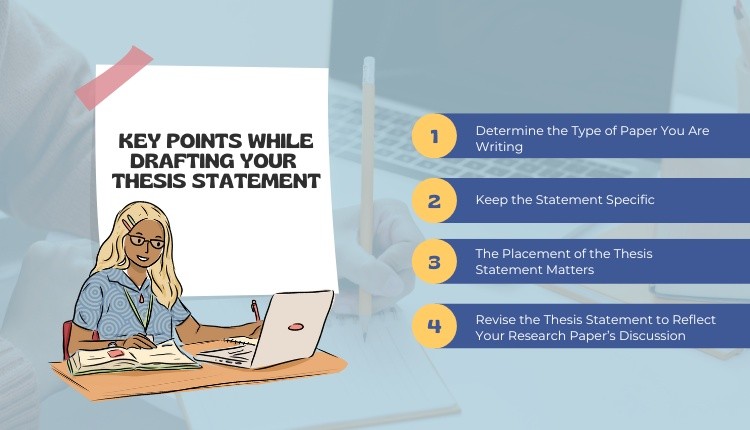
5 Tips to Create a Compelling Thesis Statement
A thesis statement is a crucial part of any academic paper. Clearly stating the main idea of your research helps you focus on the objectives of your paper. Refer to the following tips while drafting your statement:
1. Keep it Concise
The statement should be short and precise. It should contain no more than a couple of sentences.
2. Make it Specific
The statement should be focused on a specific topic or argument. Covering too many topics will only make your paper weaker.
3. Express an Opinion
The statement should have an opinion on an issue or controversy. This will make your paper arguable and interesting to read.
4. Be Assertive
The statement should be stated assertively and not hesitantly or apologetically. Remember, you are making an argument — you need to sound convincing!
5. Support with Evidence
The thesis should be supported with evidence from your paper. Make sure you include specific examples from your research to reinforce your objectives.
Thesis Statement Examples *
Example 1 – alcohol consumption.
High levels of alcohol consumption have harmful effects on your health, such as weight gain, heart disease, and liver complications.
This thesis statement states specific reasons why alcohol consumption is detrimental. It is not required to mention every single detriment in your thesis.
Example 2 – Benefits of the Internet
The internet serves as a means of expediently connecting people across the globe, fostering new friendships and an exchange of ideas that would not have occurred before its inception.
While the internet offers a host of benefits, this thesis statement is about choosing the ability that fosters new friendships and exchange ideas. Also, the research needs to prove how connecting people across the globe could not have happened before the internet’s inception — which is a focused research statement.
*The following thesis statements are not fully researched and are merely examples shown to understand how to write a thesis statement. Also, you should avoid using these statements for your own research paper purposes.
A gripping thesis statement is developed by understanding it from the reader’s point of view. Be aware of not developing topics that only interest you and have less reader attraction. A harsh yet necessary question to ask oneself is — Why should readers read my paper? Is this paper worth reading? Would I read this paper if I weren’t its author?
A thesis statement hypes your research paper. It makes the readers excited about what specific information is coming their way. This helps them learn new facts and possibly embrace new opinions.
Writing a thesis statement (although two sentences) could be a daunting task. Hope this blog helps you write a compelling one! Do consider using the steps to create your thesis statement and tell us about it in the comment section below.
Great in impactation of knowledge
An interesting expository. Thanks for the concise explanation.
Rate this article Cancel Reply
Your email address will not be published.

Enago Academy's Most Popular Articles
![thesis statements on ai What is Academic Integrity and How to Uphold it [FREE CHECKLIST]](https://www.enago.com/academy/wp-content/uploads/2024/05/FeatureImages-59-210x136.png)
Ensuring Academic Integrity and Transparency in Academic Research: A comprehensive checklist for researchers
Academic integrity is the foundation upon which the credibility and value of scientific findings are…

- Publishing Research
- Reporting Research
How to Optimize Your Research Process: A step-by-step guide
For researchers across disciplines, the path to uncovering novel findings and insights is often filled…

- Industry News
- Trending Now
Breaking Barriers: Sony and Nature unveil “Women in Technology Award”
Sony Group Corporation and the prestigious scientific journal Nature have collaborated to launch the inaugural…

Achieving Research Excellence: Checklist for good research practices
Academia is built on the foundation of trustworthy and high-quality research, supported by the pillars…

- Promoting Research

Plain Language Summary — Communicating your research to bridge the academic-lay gap
Science can be complex, but does that mean it should not be accessible to the…
Choosing the Right Analytical Approach: Thematic analysis vs. content analysis for…
Comparing Cross Sectional and Longitudinal Studies: 5 steps for choosing the right…
Research Recommendations – Guiding policy-makers for evidence-based decision making

Sign-up to read more
Subscribe for free to get unrestricted access to all our resources on research writing and academic publishing including:
- 2000+ blog articles
- 50+ Webinars
- 10+ Expert podcasts
- 50+ Infographics
- 10+ Checklists
- Research Guides
We hate spam too. We promise to protect your privacy and never spam you.
I am looking for Editing/ Proofreading services for my manuscript Tentative date of next journal submission:

As a researcher, what do you consider most when choosing an image manipulation detector?
Instant Thesis Statement AI Generator
Generate compelling thesis statements effortlessly with our advanced AI-powered tool. Save time and excel.
2M+ Professionals choose us
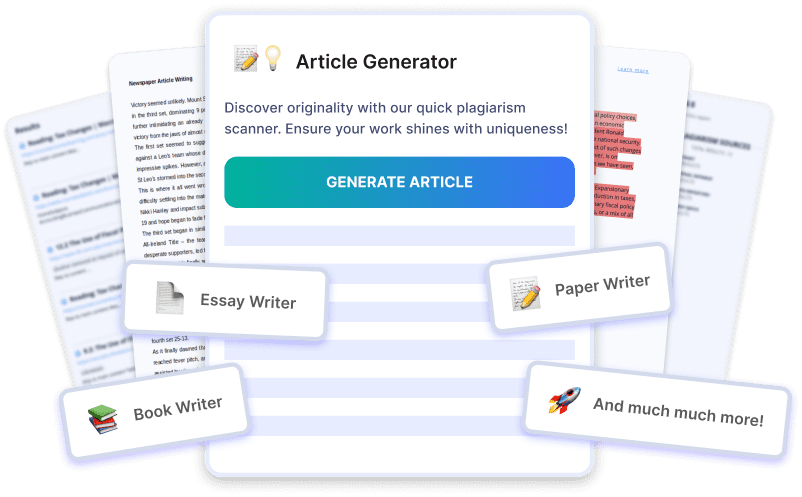
AI Benefits in Thesis Writing
Accurate results.
Get precise and well-crafted thesis statements tailored to your requirements in seconds.
Time-Saving Solution
Effortlessly generate thesis statements, saving valuable time for research and analysis.
Enhanced Productivity
Boost your productivity by quickly obtaining high-quality thesis statements, allowing more time for refining your work.
Boost Your Writing with AI Thesis Statement Generator
Efficiency in writing.
Using AI writing tools can significantly enhance your writing efficiency. These advanced tools offer various features and capabilities to help you generate engaging content quickly. With the best AI writing tools, you can streamline your writing process and produce high-quality work in less time.
Online writing tools provide a user-friendly interface and intuitive functions that enable you to craft compelling thesis statements with ease. By utilizing AI tools for writing, you can efficiently create impactful thesis statements, allowing you to focus more on developing your ideas and less on the technical aspects of writing.

Enhanced Creativity
AI thesis statement generators can spark creativity by offering innovative suggestions and insights. These writing AI tools analyze your input and offer suggestions to enhance the clarity and originality of your thesis statement. By leveraging the capabilities of AI tools for writing, you can explore new perspectives and refine your ideas, leading to more creative and captivating thesis statements.
Best AI writing tools provide intelligent prompts and recommendations, igniting your creativity and helping you craft compelling thesis statements that resonate with your audience. With the assistance of AI tools for writing, you can elevate the creativity and impact of your writing, resulting in more engaging and persuasive content.

Refined Writing Quality
Utilizing AI thesis statement generators can elevate the quality of your writing. These tools offer advanced language processing and analysis, enabling you to refine the structure, coherence, and overall quality of your thesis statement. With the integration of the best AI writing tools, you can enhance the precision and effectiveness of your writing, ensuring that your thesis statement conveys your ideas with clarity and impact.
AI tools for writing provide valuable assistance in refining the language and tone of your thesis statement, empowering you to produce polished and professional writing. By leveraging online writing tools, you can refine the quality of your thesis statement, captivating your readers with articulate and compelling content.

Maximizing Your Thesis Statement with AI Writing Tools
Utilize intelligent suggestions.
When using the best AI tools for writing, make sure to leverage the intelligent suggestions and recommendations offered by the platform. These AI writing tools provide valuable insights and prompts to enhance the clarity and impact of your thesis statement. By incorporating the intelligent suggestions, you can refine and strengthen your writing, resulting in a more compelling thesis statement.
By integrating the intelligent suggestions provided by AI writing tools, you can elevate the quality and effectiveness of your thesis statement. These tools offer innovative recommendations and insights that can enrich your writing, enabling you to craft a powerful and persuasive thesis statement for your academic or professional endeavors.
Embrace Creative Assistance
Embrace the creative assistance offered by AI thesis statement generators to infuse originality and creativity into your writing. The best AI writing tools provide creative prompts and suggestions to ignite your imagination and refine your thesis statement. By embracing the creative assistance of AI tools for writing, you can explore new perspectives and develop unique thesis statements that captivate your audience.
AI writing tools offer a wealth of creative assistance, empowering you to infuse your thesis statement with fresh ideas and innovative concepts. By embracing the creative features of these tools, you can unleash your creativity and produce exceptional thesis statements that reflect your unique insights and perspectives.
Optimize Language Precision
Optimize the language precision of your thesis statement using AI writing tools to ensure clarity and impact. These tools offer advanced language processing capabilities and analysis, enabling you to refine the vocabulary and structure of your thesis statement. By optimizing the language precision with AI tools for writing, you can convey your ideas with precision and eloquence, captivating your audience with articulate and impactful writing.
By integrating AI writing tools into your writing process, you can optimize the language precision of your thesis statement, ensuring that every word resonates with clarity and purpose. These tools empower you to refine the linguistic elements of your writing, resulting in a polished and professional thesis statement that effectively communicates your ideas.
Streamline Writing Process
Streamline your writing process with the help of AI thesis statement generators to enhance efficiency and productivity. These tools offer a streamlined approach to crafting compelling thesis statements, saving you time and effort in the writing process. By utilizing the features of the best AI writing tools, you can streamline your writing process and focus on developing impactful content without being encumbered by technical intricacies.
AI writing tools provide a seamless writing experience, allowing you to streamline the process of creating persuasive thesis statements with ease. By integrating these tools into your writing workflow, you can optimize your productivity and efficiency, resulting in high-quality thesis statements that reflect your ideas with clarity and precision.
Refine Content Quality
Refine the quality of your thesis statement by utilizing AI writing tools to enhance coherence and structure. These tools offer valuable insights and analysis to refine the overall quality of your writing, ensuring that your thesis statement is compelling and coherent. By leveraging the capabilities of AI tools for writing, you can refine the content quality of your thesis statement, elevating it to a professional and impactful standard.
AI writing tools provide indispensable assistance in refining the content quality of your thesis statement, enabling you to produce polished and professional writing. With the integration of these tools, you can refine the structure, coherence, and impact of your thesis statement, captivating your audience with articulate and persuasive content.
How to use Article Generator
Choose a template.
Select the necessary template from the template gallery.
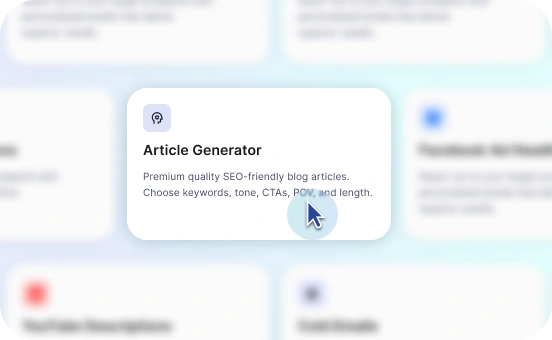
Provide more details
Fill out the carefully selected inputs to create the best quality of output content.
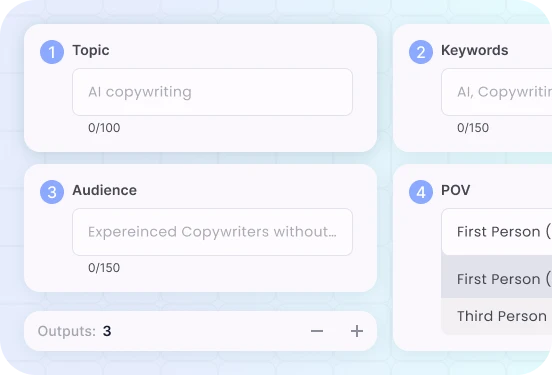
Enjoy the results
Copy, save for later, rate the output or hit regenerate button.
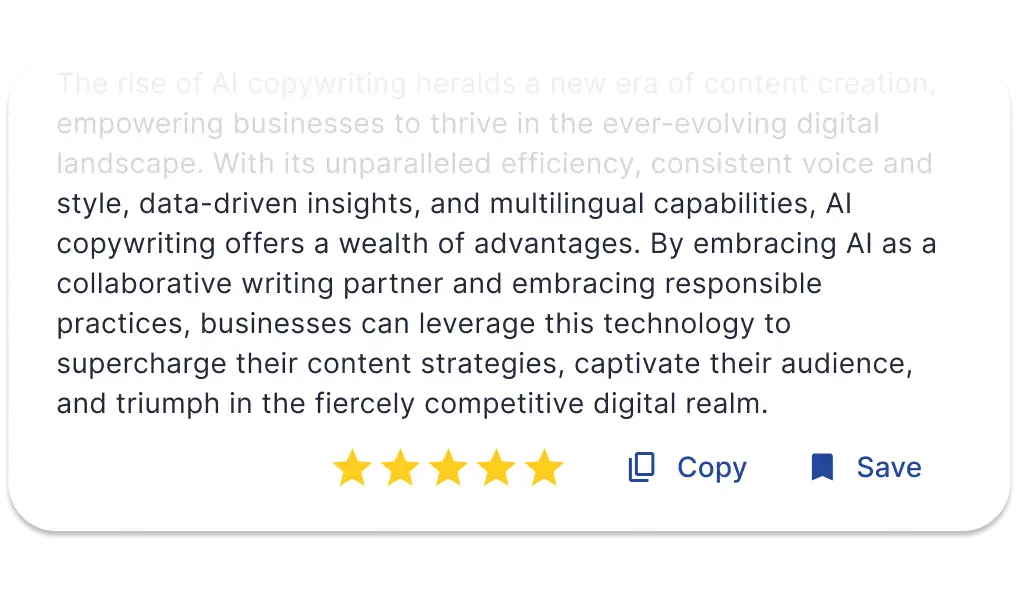
Exploring AI Thesis Statement Generator
Discover the power of AI thesis statement generators in crafting compelling and impactful content. Explore the following examples to unlock creative potential and enhance your writing process with AI tools.
Craft a compelling thesis statement for a literary analysis essay on the theme of identity in the novel 'The Great Gatsby.'
In F. Scott Fitzgerald's 'The Great Gatsby,' the theme of identity is intricately woven into the narrative, reflecting the complexities of self-perception and societal influences. Crafting a compelling thesis statement for a literary analysis essay requires a deep understanding of how characters' identities shape the storyline and thematic elements. By utilizing AI thesis statement generators, you can explore nuanced perspectives and refine your thesis to encapsulate the profound exploration of identity in the novel.
The best AI tools for writing offer invaluable assistance in analyzing the thematic nuances and character developments within 'The Great Gatsby.' Leveraging the capabilities of AI writing tools, you can craft a thesis statement that captures the essence of identity exploration in the novel, providing a compelling perspective for your literary analysis essay. These tools enable you to delve into the complexities of the theme and articulate a thesis statement that resonates with depth and insight.
Exploring the use of AI writing tools for crafting a thesis statement on the theme of identity in 'The Great Gatsby' presents an opportunity to refine your analysis and infuse your writing with an enriched perspective. By integrating the innovative features of AI tools for writing, you can elevate the quality and impact of your thesis statement, offering a profound exploration of identity that captivates readers and showcases your analytical prowess.
AI thesis statement generators empower you to delve into the intricacies of identity in 'The Great Gatsby,' unlocking new dimensions of analysis and interpretation. With the support of these advanced writing tools, you can craft a thesis statement that encapsulates the profound thematic exploration, enriching your literary analysis with compelling insights and thought-provoking perspectives. Embrace the power of AI tools to elevate your writing and convey a captivating thesis statement that resonates with the complexities of identity in Fitzgerald's masterpiece.
The benefits of using AI writing tools for crafting a thesis statement extend beyond efficiency, offering a platform for refining your analytical prowess and creative expression. By embracing the capabilities of these tools, you can embark on a journey of in-depth exploration and articulate a thesis statement that captures the essence of identity in 'The Great Gatsby' with eloquence and insight. Discover the transformative potential of AI tools for writing as you craft a compelling and impactful thesis statement for your literary analysis essay.
Develop a thesis statement for a historical research paper exploring the impact of technological advancements on society during the Industrial Revolution.
The Industrial Revolution marked a pivotal era of technological advancements that reshaped societal structures and norms, offering a profound impact on various facets of human civilization. Crafting a compelling thesis statement for a historical research paper necessitates a comprehensive understanding of how technological innovations influenced social, economic, and cultural dynamics during this transformative period. Leveraging AI thesis statement generators, you can delve into the intricate interplay of technology and society, refining your thesis to encapsulate the multifaceted impact of technological advancements during the Industrial Revolution.
The best AI tools for writing provide invaluable support in analyzing the historical significance of technological advancements during the Industrial Revolution. By harnessing the capabilities of AI writing tools, you can craft a thesis statement that illuminates the transformative influence of technology on societal paradigms, offering a compelling focal point for your historical research paper. These tools empower you to delve into the complexities of technological progress and articulate a thesis statement that resonates with historical insight and analytical depth.
Exploring the use of AI writing tools for developing a thesis statement on the impact of technological advancements during the Industrial Revolution presents an opportunity to enrich your research with nuanced perspectives and comprehensive analysis. By integrating the innovative features of AI tools for writing, you can elevate the quality and impact of your thesis statement, providing a comprehensive exploration of technological innovations that captivates readers and showcases your historical acumen.
AI thesis statement generators enable you to explore the profound impact of technological advancements during the Industrial Revolution, offering a platform to refine your historical analysis and convey a thesis statement that encapsulates the transformative influence of technology on society. With the support of these advanced writing tools, you can craft a thesis statement that illuminates the intricate dynamics of technological progress, enriching your research with compelling insights and thought-provoking perspectives. Embrace the power of AI tools to elevate your historical analysis and articulate a thesis statement that resonates with the enduring legacy of technological innovation during this pivotal era.
The benefits of using AI writing tools for developing a thesis statement extend beyond efficiency, providing a conduit for refining your historical interpretation and scholarly expression. By embracing the capabilities of these tools, you can embark on a journey of comprehensive exploration and articulate a thesis statement that captures the transformative impact of technological advancements during the Industrial Revolution with eloquence and insight. Discover the transformative potential of AI tools for writing as you craft a compelling and impactful thesis statement for your historical research paper.
Frequently Asked Questions
What is a thesis statement ai generator, how does an ai writing tool help in generating a thesis statement, what are the benefits of using ai-powered writing tools for generating a thesis statement, can ai writing tools be used for other writing tasks besides generating thesis statements, are there examples of other writing tools available on justdone.ai, how can i access the ai writing tools on justdone.ai, join 1,000,000+ creators and professionals from trusted companies by choosing us, .css-1d7fhal{margin:0;font-family:"roboto","helvetica","arial",sans-serif;font-weight:400;font-size:1rem;line-height:1.5;letter-spacing:0.00938em;max-width:700px;}@media (min-width:0px){.css-1d7fhal{font-size:24px;font-weight:600;line-height:32px;font-family:'__inter_6eddd9','__inter_fallback_6eddd9';}}@media (min-width:744px){.css-1d7fhal{font-size:45px;font-weight:600;line-height:52px;font-family:'__inter_6eddd9','__inter_fallback_6eddd9';}} have a task that has no tool our chat knows how to do it.
Author thesis
Powered by CHATin
Smodin's Thesis Generator: The Ultimate Tool for Crafting a Winning Thesis
Generate a thesis statement, or a multi-part thesis in just a click with our Thesis Generator. Quickly find sources for your thesis with our AI Research tool to produce a scholarly quality thesis.
Smodin's Free Thesis Generator & Thesis Statement Writer
If you're struggling to come up with a thesis statement for your research paper, Smodin's free thesis generator can help. Our innovative tool uses advanced AI algorithms to quickly generate thesis statements based on your topic and requirements. With Smodin Thesis generator, you can save time and effort while ensuring your thesis statement is clear, concise, and on-point.
How Smodin's Free Thesis Generator Works
Smodin's free thesis generator uses advanced AI algorithms to quickly and accurately generate thesis statements based on your topic and requirements. To use our tool, simply input your topic or subject, choose the type of paper you're writing, and select the main idea you want to convey in your thesis statement.
How To use Smodin Thesis Statement Writer
Using Smodin's free thesis generator is simple and easy, and can save you valuable time and effort when writing a research paper. With our tool, you can generate high-quality thesis statements quickly and efficiently, giving you more time to focus on analysis and writing. So why not give Smodin's free thesis generator a try today and see how it can benefit your research paper writing process.
Tips for Using Smodin's Free Thesis Generator
To get the most out of Smodin's free thesis generator, input a clear and concise topic or keywords to ensure accurate results. Refine and edit the generated thesis statement to ensure it fits your research paper perfectly, and use it as a starting point for your own research and writing. With these tips in mind, you can streamline the process of generating a thesis statement and produce high-quality research papers that meet your specific requirements and style.
Why Smodin's Free Thesis Generator is the Perfect Tool for Students and Researchers
Smodin's free thesis generator is an essential tool for students and researchers looking to streamline the process of writing a research paper. With advanced AI algorithms, our tool quickly generates clear and concise thesis statements based on your topic and requirements, ensuring your research paper is of the highest quality.
In addition to saving time and effort, using Smodin's free thesis generator ensures your thesis statement is well-crafted and effective. With our tool, you can focus on conducting thorough research and crafting a compelling argument, rather than getting bogged down in the preliminary stages of the writing process.
© 2024 Smodin LLC
- Tools Suggest
Thesis Statement Generator
Get your thesis statement in one click, what do you want to write thesis about.
Example: benefits of swimming vs other types of sport
We are excited to announce that ToolBaz AI is now CAPTCHA-free! Enjoy a smoother and faster experience without any interruptions.

Related Tools
ToolBaz thesis statement generator is a tool that helps you create a thesis statement for your research paper. A thesis statement is the central argument of your paper and states what you hope to prove with your research. Thesis generator will help you create a clear and concise thesis statement that will guide your research and help you stay on track.
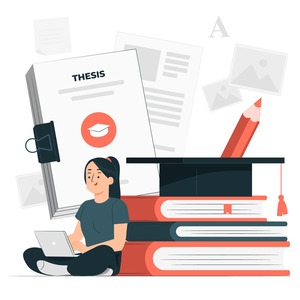
Image by storyset on Freepik
How to start?
Here's how to start:
- Enter the thesis topic in the "Input" field.
- Click the "reCaptcha" checkbox to verification
- Click the "WRITE" button.
- Our AI tool will generate a thesis statement for you.
- Copy and paste thesis into a text editor and start writing!
Generate Thesis Instantly
If you are a student and looking for a thesis generator, there are some great tools available that can help you. Thesis generators can be a great way to get your thesis done quickly and without a lot of hassle.

The Benefits of AI Thesis Generator
If you are in the process of writing a thesis, then you may have considered using a thesis generator. This tool can be extremely helpful in creating a well-written and organized thesis. There are many benefits to using AI thesis statement maker, including:
1. Time-Saving:
It can save you a lot of time in the writing process. This is because it can help you to quickly and easily create a outline for your paper. This can be a great time-saver, especially if you are working on a tight deadline.
2. Organization:
A good thesis generator can also help you to organize your thoughts and ideas. This can be extremely helpful in ensuring that your paper flows smoothly and is easy to read.
3. Quality:
It can also help to improve the quality of your paper. This is because it can help you to find and correct any grammar or punctuation errors. Additionally, a thesis generator can help you to choose better and more appropriate words to use in your paper.
4. Creativity:
ToolBaz statement maker can also help to spark your creativity. This is because it can help you to come up with new and interesting ideas for your paper. Additionally, thesis maker can help you to create a more unique and original thesis.
5. Efficiency:
It can also help to make your writing process more efficient. This is because it can help you to quickly and easily create a outline for your paper. Additionally, ToolBaz AI thesis generator can help you to find and correct any grammar or punctuation errors.
Overall, there are many benefits to using a thesis generator. If you are having trouble getting started with your paper, or if you are struggling to organize your thoughts, then a thesis generator may be just what you need.
The Bottom Line
The bottom line is that thesis generator can be a helpful tool when you are stuck and cannot seem to come up with a good idea for your paper. However, you should not rely on it too much and should always consult with your instructor before using one.
Content Writing Tools
Book & story writing.

Poem & Lyrics Writing
Letter writing tools, re-writing tools, more writing tools.
How to Craft Effective Thesis Statements With AI Writing Tools in UK for 2024?

- February 19, 2024 Updated
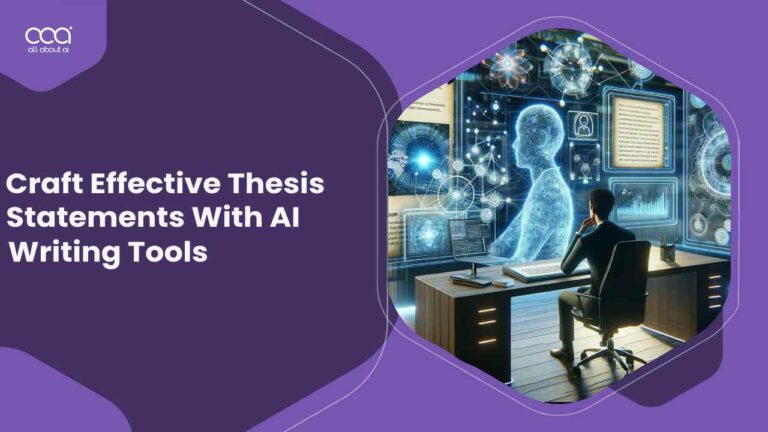
As an academic writer, I’ve found that the thesis statement is a critical element of any paper. It sets the tone and direction for my writing. Recently, I’ve been incorporating AI writing tools into my process, and they’ve significantly transformed how I approach thesis statements.
In this article, I’ll share my experience with some of the best AI writing tools in UK , highlighting how to craft effective thesis statements with AI writing tools in UK. Let’s get into it.
How to Craft Effective Thesis Statements With AI Writing Tools in UK for 2024: Step-by-Step Guide
Here, I’ll share my step-by-step approach and teach you how to craft effective thesis statements with AI writing tools in UK. This method has consistently improved both the efficiency and effectiveness of my academic writing.
Step 1: Identifying the Topic
The first step in thesis writing is identifying a relevant and engaging topic. AI tools such as OpenAI’s GPT-4 are invaluable in this stage, offering up-to-date suggestions on trending and significant topics.
These tools analyze current research and discussions in various fields, providing me with a broad range of potential topics that are both contemporary and academically relevant.
Step 2: Narrowing the Focus
Once a topic is chosen, the next challenge is to narrow it down to a specific aspect that is both manageable and significant.
AI tools integrated with databases like Google Scholar or JSTOR aid in this process by analyzing large volumes of data and research papers.
This helps in focusing on a particular aspect or angle of the chosen topic, ensuring that the thesis is both specific and substantive.
Step 3: Formulating the Argument
Formulating a clear and debatable thesis statement is a critical step. AI-powered tools like Grammarly and Hemingway Editor are useful here.
They offer linguistic analysis, suggesting ways to construct a strong argument that is both clear and persuasive.
These AI writing tools analyze sentence structure, word choice, and overall readability, ensuring that the thesis statement is cogent and impactful.
Step 4: Refining the Thesis Statement
Refinement is key to crafting an effective thesis statement. AI tools such as ProWritingAid provide suggestions on improving the clarity and conciseness of the statement.
They help in fine-tuning the language, ensuring that the thesis statement is well-phrased, impactful, and devoid of any ambiguity or redundancy.
Step 5: Seeking Feedback
Gathering feedback on the thesis statement is crucial. Platforms like Scribbr use AI algorithms to provide constructive feedback on the strength, coherence, and clarity of the thesis statement.
They offer insights into how the statement can be improved, making it more robust and compelling.
Step 6: Final Review
Finally, ensuring the originality of the thesis statement is paramount. Tools like Turnitin are essential in this final stage.
They check for originality and uniqueness, ensuring that the thesis statement is free from unintentional plagiarism and stands out in the academic discourse.
What Are the Essentials of a Thesis Statement?
In my writing, I ensure that my thesis statement is clear, concise, and well-defined, demonstrating how to craft effective thesis statements with AI writing tools in UK. It’s the guiding light for the reader, steering them through my argument or analysis.

The key elements I focus on in a strong thesis statement include:
Clarity and Conciseness
A thesis statement is the backbone of any well-written academic paper , providing a clear and concise summary of the argument or analysis that follows. It’s essential that this statement is devoid of complex jargon and unnecessarily long sentences.
Clarity ensures immediate comprehension by the reader, while conciseness prevents dilution of the core argument, keeping the reader’s attention focused.
Specificity and Focus
The effectiveness of a thesis statement largely depends on its ability to narrow down a broad topic into a specific, focused argument.
This specificity allows for a detailed and in-depth exploration of the subject matter, preventing the paper from veering off into too general or unrelated discussions.
A focused thesis guides the direction of research and writing, ensuring that every element of the paper contributes towards exploring this central argument.
Arguable and Defensible
An impactful thesis statement is one that presents a clear argument or perspective, which is not only open to discussion but can also be supported with concrete evidence.
This argumentative nature invites critical thinking and engagement from the reader, prompting them to consider the topic from the writer’s perspective and anticipate the evidence that will be presented in support of this argument.
Originality and Insight
In academic writing, a thesis statement should not merely state a fact or a universally accepted truth. Instead, it should offer an original perspective or a novel approach to the topic.
This originality is what contributes to the broader academic dialogue, providing new insights or challenging existing ones.
The thesis should make a unique contribution to the topic, showcasing the writer’s deep understanding and personal interpretation of the subject. The best AI writing tools for academic writing can help ensure originality in your thesis statement.
Alignment with the Paper
A thesis statement must be in harmony with the rest of the paper. Every paragraph, argument, and piece of evidence presented in the paper should directly support and reinforce the thesis statement.
This alignment ensures a cohesive and coherent structure, where all elements of the paper work synergistically to argue or analyze the central claim.
How AI Writing Tools Assist in Refining and Rewriting Thesis Statements
In my experience, artificial intelligence tools are excellent at offering alternative phrasings, checking consistency with the overall content, and improving clarity, embodying how to craft effective thesis statements with AI writing tools in UK. They suggest various ways to express the thesis and ensure it aligns with the rest of my content.
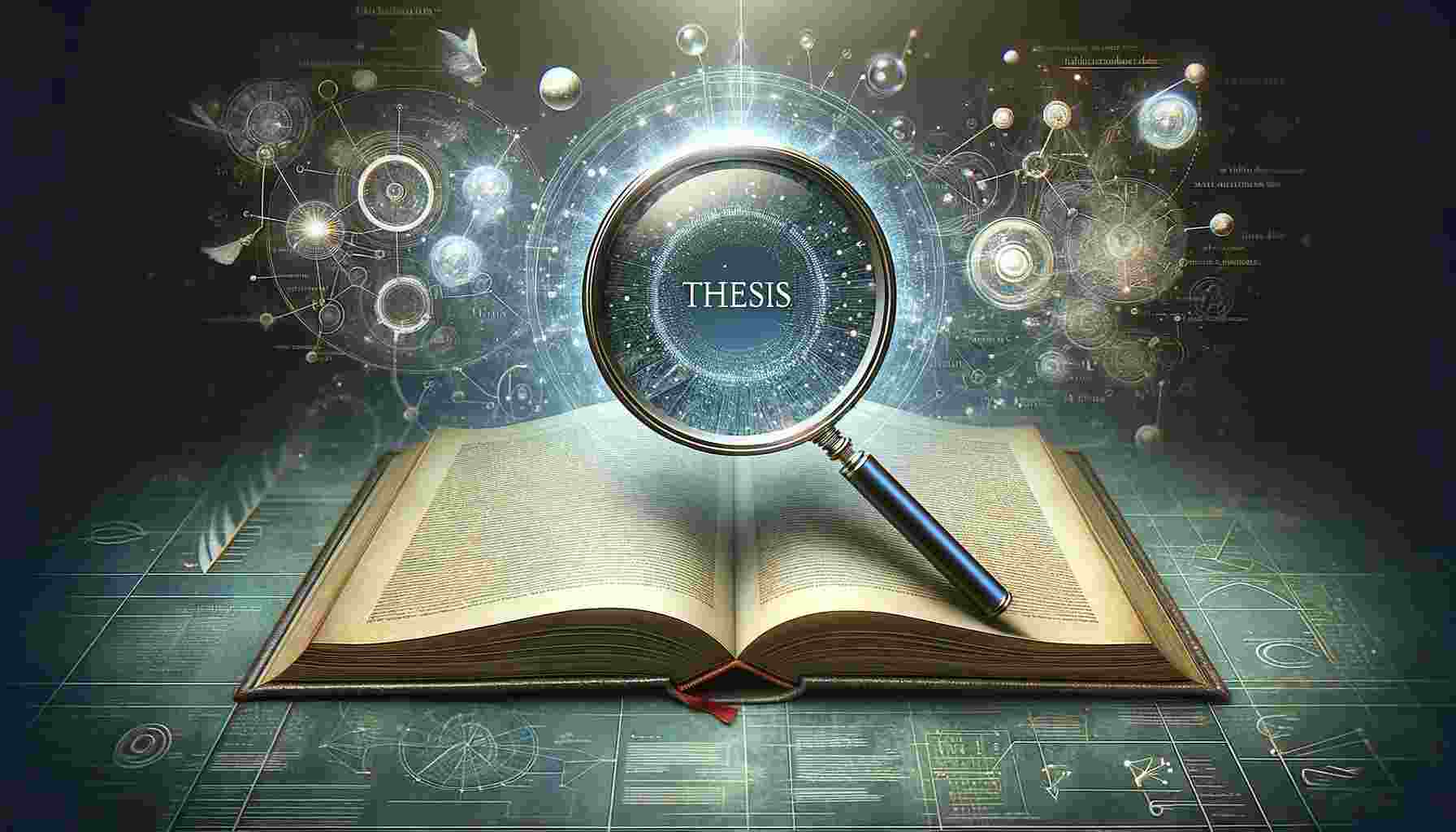
Suggesting Variations
One of the primary ways AI tools assist in thesis writing is by suggesting multiple variations of a thesis statement.
These suggestions provide different ways of expressing the same idea, helping to find the most effective and impactful phrasing.
Checking Consistency
AI tools are highly efficient in ensuring that the thesis statement aligns with the overall content and tone of the paper.
They analyze the entire document to ensure that every part of the paper supports and reinforces the thesis, maintaining a cohesive argument throughout.
Improving Clarity
AI suggestions are instrumental in enhancing the clarity of the thesis statement. They help rephrase complex or ambiguous statements into clearer, more understandable language. This improvement in clarity is crucial for engaging and retaining the reader’s interest.
Enhancing Persuasiveness
AI tools are adept at suggesting more persuasive language and stronger arguments, thereby making the thesis more compelling.
They analyze the persuasive elements of language, such as word choice and sentence structure, to enhance the argumentative power of the thesis statement.
Detecting Redundancies
AI tools efficiently identify and eliminate redundant phrases or arguments within the thesis statement. This streamlining ensures that the statement is concise and focused, enhancing its overall impact.
Offering Customized Suggestions
Based on the style, tone, and topic of the paper, AI tools provide tailored advice to make the thesis more effective.
These customized suggestions are particularly helpful in ensuring that the thesis statement is well-suited to the specific requirements and expectations of the paper’s intended audience.
Incorporating AI Tools: A Comparative Insight
Comparing AI tools with traditional methods, I find that AI significantly enhances efficiency in idea generation, linguistic variations , and real-time suggestions, making the process of crafting a thesis statement less time-consuming and more effective.

Speed of Research
One of the most significant advantages of using AI tools in thesis writing is the speed at which research can be conducted.
AI tools provide quick and easy access to a vast array of datasets and research materials, a process that would take significantly longer using traditional research methods.
Idea Generation
Compared to traditional brainstorming methods, AI tools offer immediate, diverse, and often more creative ideas for thesis statements.
These tools can analyze existing literature and trends to suggest unique angles and perspectives that might not be immediately apparent through conventional brainstorming.
Language and Style
In terms of language and style, AI tools offer a level of refinement and sophistication that surpasses traditional manual proofreading and editing.
They analyze the thesis statement for language use, style, tone, and readability, ensuring that it meets high standards of academic writing.
Consistency Checking
AI tools are more efficient and accurate in checking for consistency in the thesis statement and throughout the paper.
They ensure that every part of the paper aligns with and supports the central thesis, which can be more challenging to achieve with manual reviews.
Accessibility of Resources
When it comes to accessing research materials and references, AI tools provide a broader and more comprehensive range of resources than traditional library-based research.
They offer access to the latest studies, articles, and data from various disciplines, making the research process more efficient and thorough.
Plagiarism Detection
AI-powered plagiarism checkers offer a level of thoroughness and accuracy in detecting plagiarism that is difficult to achieve through manual methods.
They scan a wide range of sources, including academic papers and online content, ensuring that the thesis statement is original and free from unintentional plagiarism.
How Do Different Paper Types Influence Thesis Formation?
The nature of the thesis statement depends on whether the paper is analytical, expository, or argumentative. Understanding how to craft effective thesis statements with AI writing tools in UK can greatly assist in tailoring your thesis to fit these specific types of papers effectively.

I use AI tools tailored to understand these differences, which offer appropriate suggestions based on the paper type.
Analytical Papers
In analytical papers, the thesis statement should dissect an idea or issue into its essential components, providing a clear and focused analysis of each part.
The thesis must guide the structure of the analysis, determining the key aspects or elements that will be examined in detail.
Expository Papers
For expository papers, the thesis should aim to explain or elucidate a particular concept or idea.
It should be informative and educational, providing clarity and insight into the subject.
A thesis in expository papers often outlines the aspects that will be explored to offer a comprehensive understanding of the topic.
Argumentative Papers
In argumentative papers, the thesis statement must take a clear and definitive stand on a particular issue or debate. It should present a strong, persuasive argument that is supported by evidence throughout the paper.
In argumentative papers, the thesis statement is often controversial or provocative, aiming to convince the reader of a particular viewpoint.
Comparative Papers
The thesis statement in comparative papers should focus on highlighting the similarities and differences between two or more subjects, ideas, or phenomena.
It requires a balanced and nuanced approach, analyzing each subject in relation to the others, and drawing insightful comparisons and contrasts.
Narrative Papers
Though less common in academic writing, narrative essays still require a thesis statement. In these papers, the thesis sets the tone for a story or personal experience, focusing on a central theme, message, or lesson.
The thesis statement in narrative essays often reflects the writer’s personal insights or learnings from the experience being shared.
Can AI write my thesis?
Can i use chatgpt for my thesis, can universities detect ai writing, which ai is best for writing a thesis, conclusion: embracing ai for effective thesis writing.
AI writing tools have revolutionized my approach to thesis writing. They serve as powerful aids, but the core of thesis writing still relies on individual critical thinking and expertise.
Now that you know how to craft effective thesis statements with AI writing tools in UK, why not check out what else AI writing tools can help you do? Check out the articles in the How To series to learn more.

Digital marketing enthusiast by day, nature wanderer by dusk. Dave Andre blends two decades of AI and SaaS expertise into impactful strategies for SMEs. His weekends? Lost in books on tech trends and rejuvenating on scenic trails.
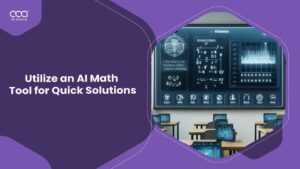
How to Utilize an AI Math Tool for Quick Solutions?

How To Do AI Covers?
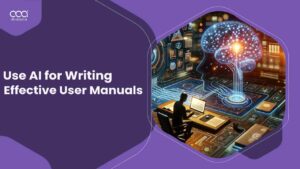
How to Use AI Tools for Writing Effective User Manuals in UK?
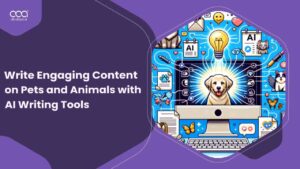
How to Write Engaging Content on Pets and Animals with AI Writing Tools in UK?
Leave a reply cancel reply.
Your email address will not be published. Required fields are marked *
Save my name, email, and website in this browser for the next time I comment.
Thank you for visiting nature.com. You are using a browser version with limited support for CSS. To obtain the best experience, we recommend you use a more up to date browser (or turn off compatibility mode in Internet Explorer). In the meantime, to ensure continued support, we are displaying the site without styles and JavaScript.
- View all journals
- Explore content
- About the journal
- Publish with us
- Sign up for alerts
- NATURE BRIEFING
- 14 May 2024
AI & robotics briefing: Why AI needs to see the ‘ugly’ side of science
- Katrina Krämer
You can also search for this author in PubMed Google Scholar
Hello Nature readers, would you like to get this Briefing in your inbox free every week? Sign up here .

An AlphaFold3 model of a bacterial enzyme bound to a chemical. Credit: Isomorphic Labs
AlphaFold gets major upgrade
A new version of DeepMind’s AlphaFold gives scientists the ability to predict protein structures during interactions with other molecules . The AI tool could be transformative for drug discovery because it can predict the shape of proteins that contain function-altering modifications, or their structure alongside those of DNA, RNA and other cellular players that are crucial to a protein’s duties. “This is just revolutionary,” says biochemist Frank Uhlmann. “It’s going to democratize structural-biology research.” Access to the AlphaFold3 server, however, is limited — partly to protect the advantage of DeepMind’s own drug-discovery spin-off company.
Nature | 6 min read
Reference: Nature paper
Algorithm spots 27,500 new asteroids
An algorithm called THOR (Tracklet-less heliocentric orbit recovery) has discovered 27,500 solar-system bodies by digging through hundreds of thousands of archive images of the night sky . Around 150 of these asteroids seem to be on paths that bring them close to Earth’s orbit — though none are in danger of colliding with our planet. Asteroids are discernable because they move against the backdrop of stars, an effect that usually requires two easy-to-compare images taken on the same night, by the same telescope. THOR can recognize an asteroid even in quite different images, which could speed up the work of asteroid-seeking telescopes and open up the hunt for Earth-threatening rocks to include data collected by any telescope.
The New York Times | 6 min read
AI maps brain slice in spectacular detail
Researchers have created an exquisitely detailed atlas of a tiny piece of one woman’s brain, which had been removed during surgery to treat her epilepsy. The sample was cut into thousands of nanometre-thick slices and each was imaged with electron microscopes. AI tools then classified different structures and cells, and created a 3D reconstruction of the sample . “I remember this moment, going into the map and looking at one individual synapse from this woman’s brain, and then zooming out into these other millions of pixels,” says neuroscientist and study co-author Viren Jain. “It felt sort of spiritual.”
Nature | 4 min read
Reference: Science paper

Rendering based on electron-microscope data, showing the positions of neurons in a fragment of the brain cortex. Neurons are coloured according to size. Credit: Google Research & Lichtman Lab (Harvard University). Renderings by D. Berger (Harvard University)
Features & opinion
Ai needs to see the ‘ugly’ side of science.
The absence of negative results in the scientific literature is affecting AI tools trained on published data. Publishing failed experiments is often seen as not worth the time and effort , even though they play an important part in forming scientists’ intuition — something that’s lacking in AI models trained only on successful data. Techniques to make up for the scarcity, such as exposing AI models to multiple copies of available negative data points during training, can introduce fresh biases. Open data repositories and alternative journals now allow scientists to share more of their negative results. “Machine learning is changing how we think about data,” says chemist Keisuke Takahashi.
Nature | 11 min read
Why animals still outrun robots
Mechanical components are often more resilient and powerful than bones and muscles, yet no robot runs as fluidly as people and other animals. In a comparison of five movement subsystems — power, frame, actuation, sensing, control — robotic technologies meet or outperform their biological counterparts in all but one (control, because brains outclass computers). Animals’ advantage seems to come from integrating all of these subsystems . “Rather than focusing on the latest, newest, fanciest, most expensive component that’s going to make my robot better, maybe we could take a step back and think more carefully about the parts we have, and do better with those,” says robotics researcher and review co-author Samuel Burden.
Nautilus | 5 min read
Reference: Science Robotics review
How AI helps plan for a renewable future
How should Ghana change its infrastructure to meet its future energy needs in a renewable way? Using computer simulation linked to AI algorithms, researchers showed that expanding full speed on solar and wind power would wreak havoc on ecosystems, food security and human health . The country would need to use existing hydropower sources whenever there isn’t enough power from wind and sun, which would make the rivers prone to dangerously erratic flooding. “In the end, [the AI model] invested in a system that put quite a bit of biogas and solar power in the north of Ghana,” explains water management researcher Julien Harou.
Nature Careers Podcast | 24 min listen
Infographic of the week
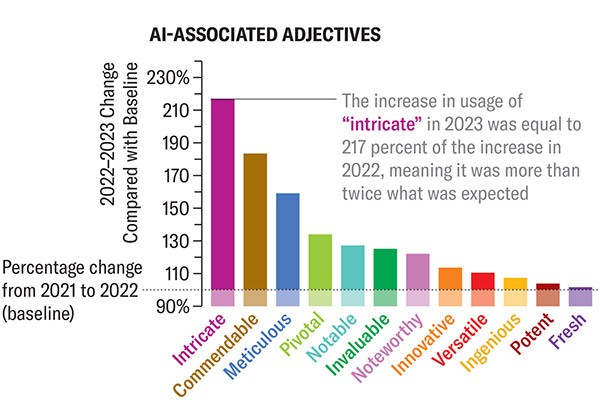
Amanda Montañez; Source: Andrew Gray
The year after ChatGPT’s release, a lot of ‘AI buzzwords’ — words that appear more often in AI-generated than in human-written texts — started turning up in scientific papers. Control words such as ‘furthermore’ and ‘consider’ didn’t experience the same increase, according to a preprint analysis by librarian Andrew Gray. He estimates that at least 60,000 papers published last year could contain AI-generated text, which is slightly more than 1% of all articles. ( Scientific American | 6 min read )
Reference: arXiv preprint
Quote of the day
“the ubiquity is such that asking if your topic touches on ai is getting to be like asking if you use a computer or electricity.”.
As one of the AI researchers providing technical advice to US lawmakers, computer scientist Kiri Wagstaff says that she has reviewed a wide variety of proposed bills to regulate the technology. ( Nature | 6 min read )
doi: https://doi.org/10.1038/d41586-024-01447-0
Today, I’m saying congrats to the proud new owner of Cheyenne, a decommissioned supercomputer . They managed to snag the machine at an auction for a bargain US$480,085. Now, they’ll only have to figure out how to move the multi-tonne unit, as well as fix the water spraying from the broken cooling system.
Please tell me what piece of computing history you’d like to see decorating your home (alongside any other feedback on this newsletter) by sending an e-mail to [email protected] .Thanks for reading,
Katrina Krämer, associate editor, Nature Briefing
With contributions by Flora Graham
Want more? Sign up to our other free Nature Briefing newsletters:
• Nature Briefing — our flagship daily e-mail: the wider world of science, in the time it takes to drink a cup of coffee
• Nature Briefing: Microbiology — the most abundant living entities on our planet – microorganisms – and the role they play in health, the environment and food systems.
• Nature Briefing: Anthropocene — climate change, biodiversity, sustainability and geoengineering
• Nature Briefing: Cancer — a weekly newsletter written with cancer researchers in mind
• Nature Briefing: Translational Research covers biotechnology, drug discovery and pharma
Related Articles
AI & robotics briefing: ‘Risk-of-death’ AI save lives in hospital trial
AI & robotics briefing: What running robots tell us about gaits
AI & robotics briefing: Winged robot demystifies insect flight
AI & robotics briefing: AI-fuelled election campaigns are here
Senior Postdoctoral Research Fellow
Senior Postdoctoral Research Fellow required to lead exciting projects in Cancer Cell Cycle Biology and Cancer Epigenetics.
Melbourne University, Melbourne (AU)
University of Melbourne & Peter MacCallum Cancer Centre
Overseas Talent, Embarking on a New Journey Together at Tianjin University
We cordially invite outstanding young individuals from overseas to apply for the Excellent Young Scientists Fund Program (Overseas).
Tianjin, China
Tianjin University (TJU)
Chair Professor Positions in the School of Pharmaceutical Science and Technology
SPST seeks top Faculty scholars in Pharmaceutical Sciences.
Chair Professor Positions in the School of Precision Instruments and Optoelectronic Engineering
We are committed to accomplishing the mission of achieving a world-top-class engineering school.
Chair Professor Positions in the School of Mechanical Engineering
Aims to cultivate top talents, train a top-ranking faculty team, construct first-class disciplines and foster a favorable academic environment.
Sign up for the Nature Briefing newsletter — what matters in science, free to your inbox daily.
Quick links
- Explore articles by subject
- Guide to authors
- Editorial policies
The reader is back to weekly publishing!

Chicago Reader
Chicago’s alternative nonprofit newsroom
collected thesis statements
Share this:.
- Click to share on Twitter (Opens in new window)
- Click to share on Facebook (Opens in new window)
By JK Anowe

More from the poetry corner

Settler’s Prayer to La Linda Nasca

Self Portrait as Blue Monday by Annie Lee

Heart Condition

my ma met mary madonna at a bustop in Chatham

Grandmother said

Nakba. Again.
Sponsored by poetry foundation.

IMAGES
VIDEO
COMMENTS
1 Create a free account. 2 Once you've logged in, find the Thesis Statement Generator template amongst our 200+ templates. 3 Fill out Topic. For example: The impact of technology on education. 4 Enable the 'Use advanced AI model?' toggle to leverage our cutting-edge AI technology for superior performance and more accurate results!
Deep learning (DL) as a Thesis Topic. Deep Learning is a subset of ML where learning imitates the inner workings of the human brain. It uses artificial neural networks to process data and make decisions. The web-like networks take a non-linear approach to processing data which is superior to traditional algorithms that take a linear approach.
Bad Thesis Statement Examples. Overly Broad: "Artificial intelligence is changing the world.". While true, this statement is overly broad, providing no clear direction or focus for research. Lack of Clear Argument: "AI and ML are important in data analysis.". This statement, while factual, lacks a clear argument or focus, not providing ...
AI Thesis Statement Generator. Lay the foundation for a compelling research paper, persuasive essay, and more with Grammarly's thesis statement generator, which helps spark original ideas for your paper's thesis statement in two quick steps. Step 1. Enter target audience. Paste or type the name of the person or group who will read your paper.
Jenni.ai is here to empower your academic writing journey with our thesis statement generator, a sophisticated AI tool dedicated to generating and refining thesis statements. Unlike other tools, Jenni ensures the authenticity and uniqueness of your thesis statement, setting a strong foundation for your academic piece.
Text generator (chatbot) based on artificial intelligence and developed by the company OpenAI. Aims to generate conversations that are as human-like as possible. Transforms input into output by "language modeling" technique. Output texts are generated as the result of a probability calculation.
Justdone. JustDone is an AI for thesis writing and content creation. It offers a straightforward three-step process for generating content, from choosing a template to customizing details and enjoying the final output. AI for thesis writing - Justdone. JustDone AI can generate thesis drafts based on the input provided by you.
AI tools can significantly speed up the brainstorming and drafting phases, giving you more time to focus on researching and outlining your thesis. This is especially useful for tight deadlines. Objectivity. AI feedback is based on data and algorithms that can provide a largely unbiased perspective on the quality of your thesis statement.
Step 4: Refining the Thesis Statement. Refinement is key to crafting an effective thesis statement. AI tools such as ProWritingAid provide suggestions on improving the clarity and conciseness of the statement. They help in fine-tuning the language, ensuring that the thesis statement is well-phrased, impactful, and devoid of any ambiguity or ...
Use AI to generate a strong, concise, and argumentative thesis statement based on a given prompt. HyperWrite's AI Thesis Statement Generator is an AI-driven tool that creates a strong, concise, and argumentative thesis statement based on your provided prompt. Powered by advanced AI models, this tool ensures your thesis statement clearly responds to the prompt and sets the direction for the ...
Then pick the two most compelling to initially research (you'll discard one later). 3. Answer the question tentatively. You probably have an initial thought of what the answer to your research question is. Write that down in as specific terms as possible. This is your working thesis .
Step 2: Write your initial answer. After some initial research, you can formulate a tentative answer to this question. At this stage it can be simple, and it should guide the research process and writing process. The internet has had more of a positive than a negative effect on education.
A thesis statement is a sentence in a paper or essay (in the opening paragraph) that introduces the main topic to the reader. As one of the first things your reader sees, your thesis statement is one of the most important sentences in your entire paper—but also one of the hardest to write! In this article, we explain how to write a thesis ...
AI-powered writing tools can analyze the context and content of the thesis statement and offer insights to enhance its quality, ensuring that it effectively communicates the writer's position. Justdone.ai's AI writing tools are designed to improve the quality and impact of thesis statements through advanced AI models and algorithms.
A Thesis Statement Generator helps users craft a strong thesis statement quickly. It aids in getting the thoughts and ideas pulled together in less time, allowing more space to focus on other aspects of paper preparation. Precision: An exact and well-articulated thesis statement doesn't come easy. This tool helps in eliminating vague words ...
Thesis Statement Generator is a tool designed to assist students in creating concise and argumentative thesis statements for essays and research papers. ... Ai-Based Thesis Statement Generator. With the use of advanced NLP and large language models like GPT-3 and GPT-4, our AI thesis statement generator creates contextually relevant, accurate ...
Generate a clear and concise thesis statement for an essay using AI. Craft the perfect thesis statement for your essay with HyperWrite's AI-powered Essay Thesis Statement Generator. Utilizing advanced AI models like GPT-4 and ChatGPT, this tool helps you create a clear and concise thesis statement that effectively communicates your essay's main argument.
Many people are worried by the use of AI in academic papers. Indeed, the practice has been described as "contaminating" scholarly literature. Some argue that using AI output amounts to plagiarism.
A thesis statement can keep the writer from getting lost in a convoluted and directionless argument. Finally, it will also ensure that the research paper remains relevant and focused on the objective. ... Any use of this content for artificial intelligence (AI), machine learning (ML), or similar purposes is strictly prohibited without prior ...
Construct powerful and well-defined thesis statements that lay the foundation for your research and essays. We built AskYourPDF as the only PDF AI Chat App you will ever need. Easily upload your PDF files and engage with our intelligent chat AI to extract valuable insights and answers from your documents to help you make informed decisions.
A thesis statement AI generator is a tool that uses artificial intelligence to help users generate a clear and concise thesis statement for their academic papers or essays. Justdone.ai offers advanced AI writing tools, including a thesis statement generator, to assist users in crafting well-structured and impactful thesis statements. ...
Smodin's free thesis generator is an essential tool for students and researchers looking to streamline the process of writing a research paper. With advanced AI algorithms, our tool quickly generates clear and concise thesis statements based on your topic and requirements, ensuring your research paper is of the highest quality.
The Benefits of AI Thesis Generator. If you are in the process of writing a thesis, then you may have considered using a thesis generator. This tool can be extremely helpful in creating a well-written and organized thesis. There are many benefits to using AI thesis statement maker, including: 1. Time-Saving:
Refinement is key to crafting an effective thesis statement. AI tools such as ProWritingAid provide suggestions on improving the clarity and conciseness of the statement. They help in fine-tuning the language, ensuring that the thesis statement is well-phrased, impactful, and devoid of any ambiguity or redundancy. ...
The absence of negative results in the scientific literature is affecting AI tools trained on published data. Plus, why animals still outrun robots and AlphaFold gets major upgrade.
Artificial intelligence (AI) will reshape student experiences, pedagogy and how people communicate, according to dozens of higher ed and technology experts, sharing opinions in a report released Monday. AI pervaded higher education so much in the last year that Educause, a nonprofit focused on the intersection of higher ed and information technology, updated its annual Teaching and Learning ...
collected thesis statements Sponsored by Poetry Foundation May 17, 2024 May 17, 2024. ... Our stories aren't written by AI. By donating to the Reader, you help pay real humans to write real stories.